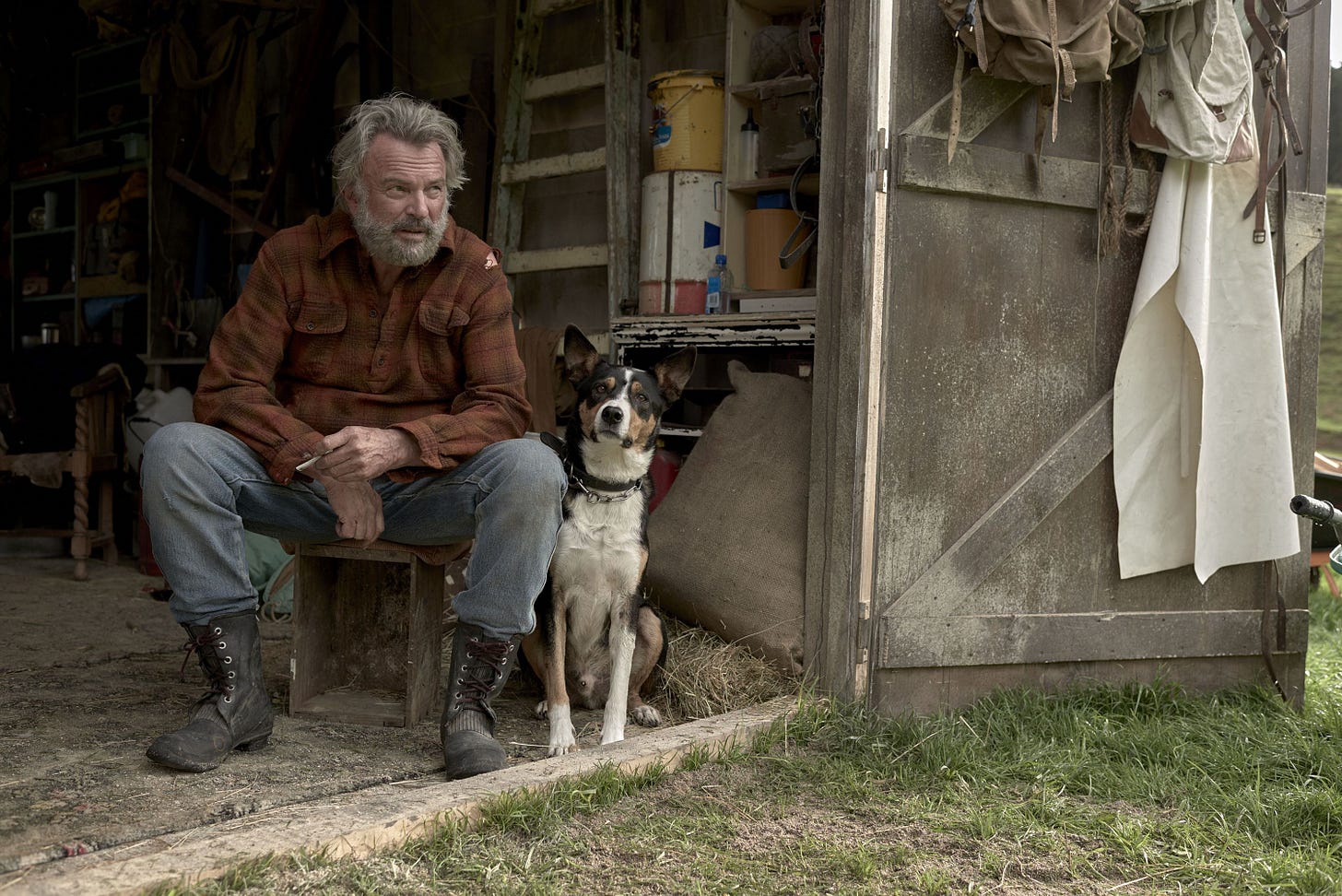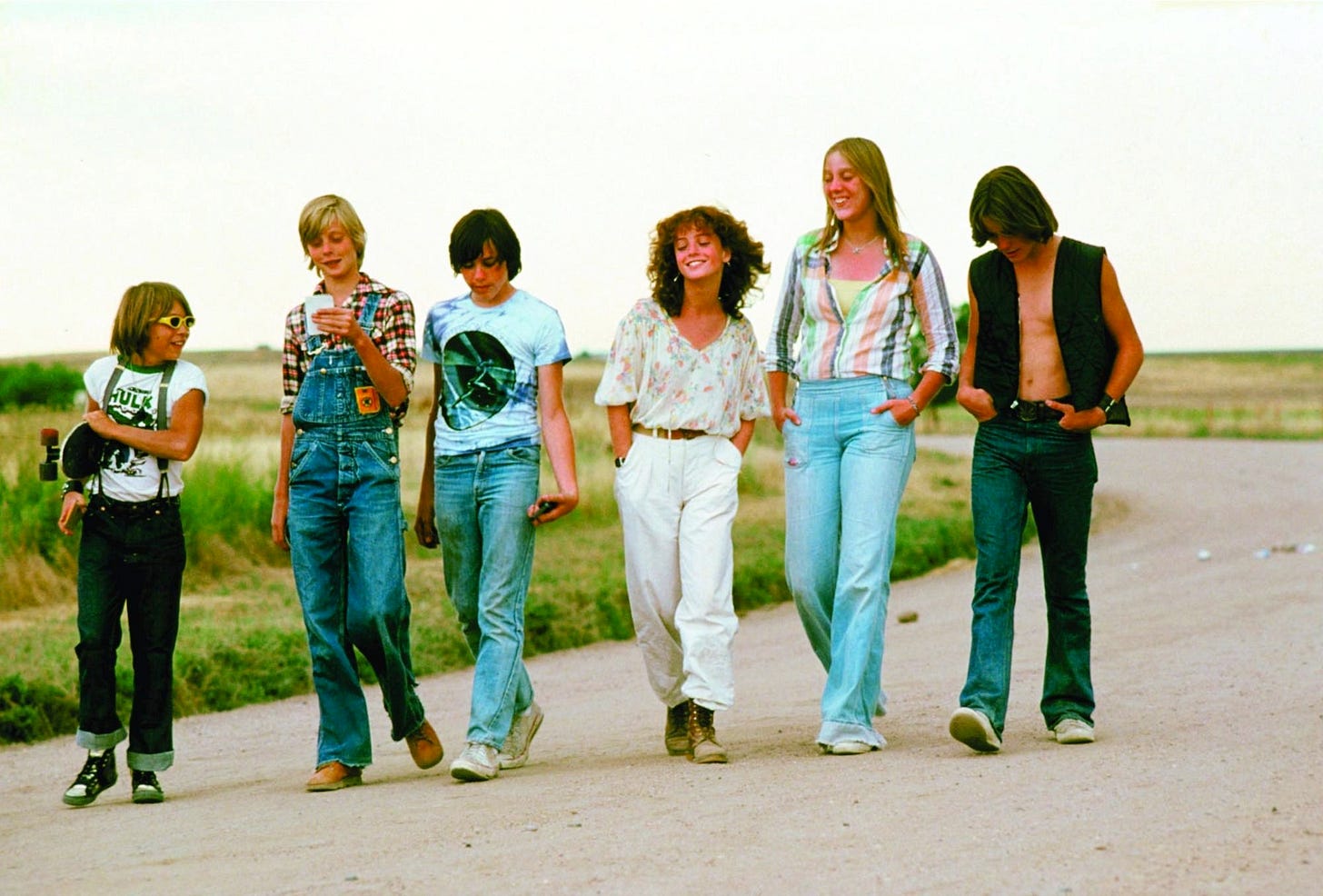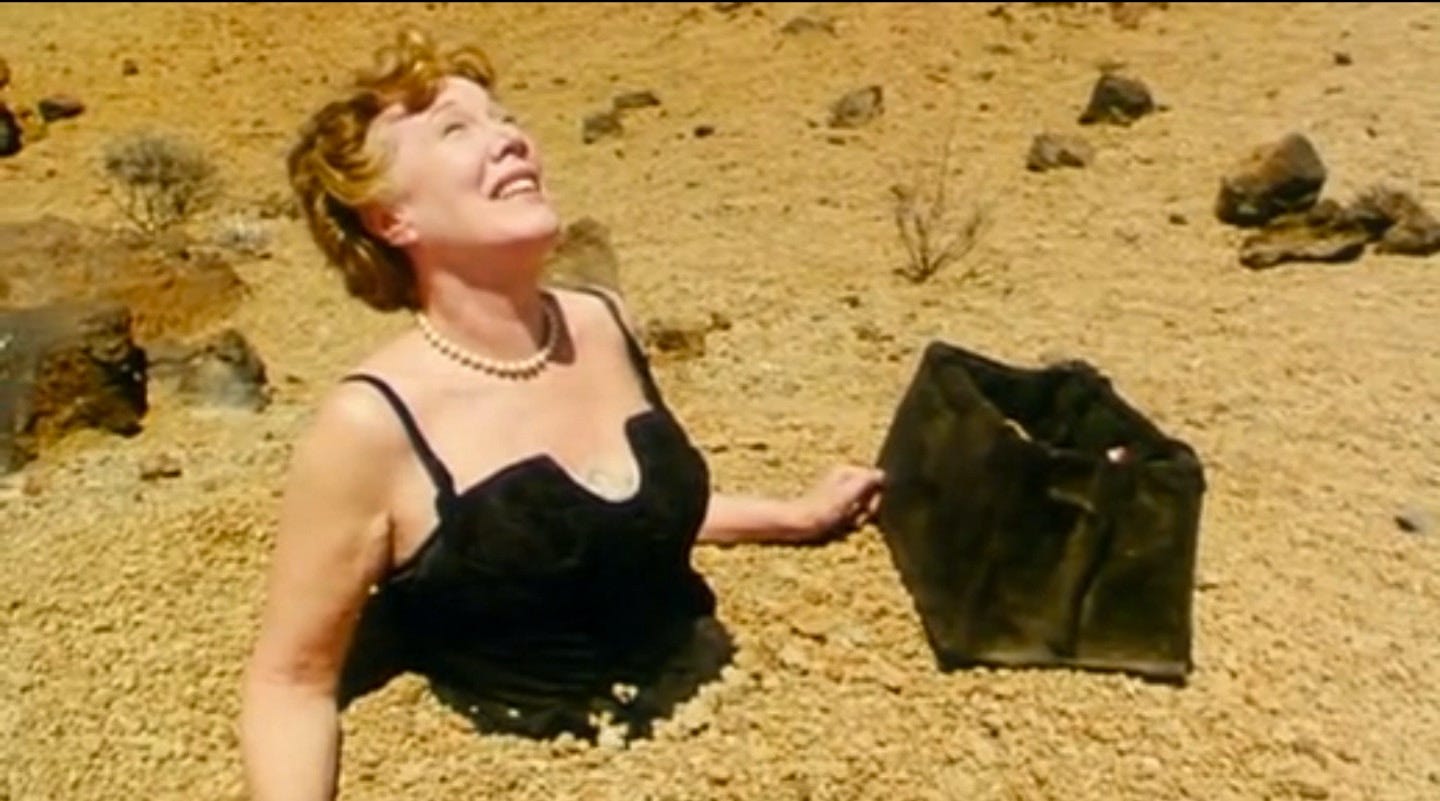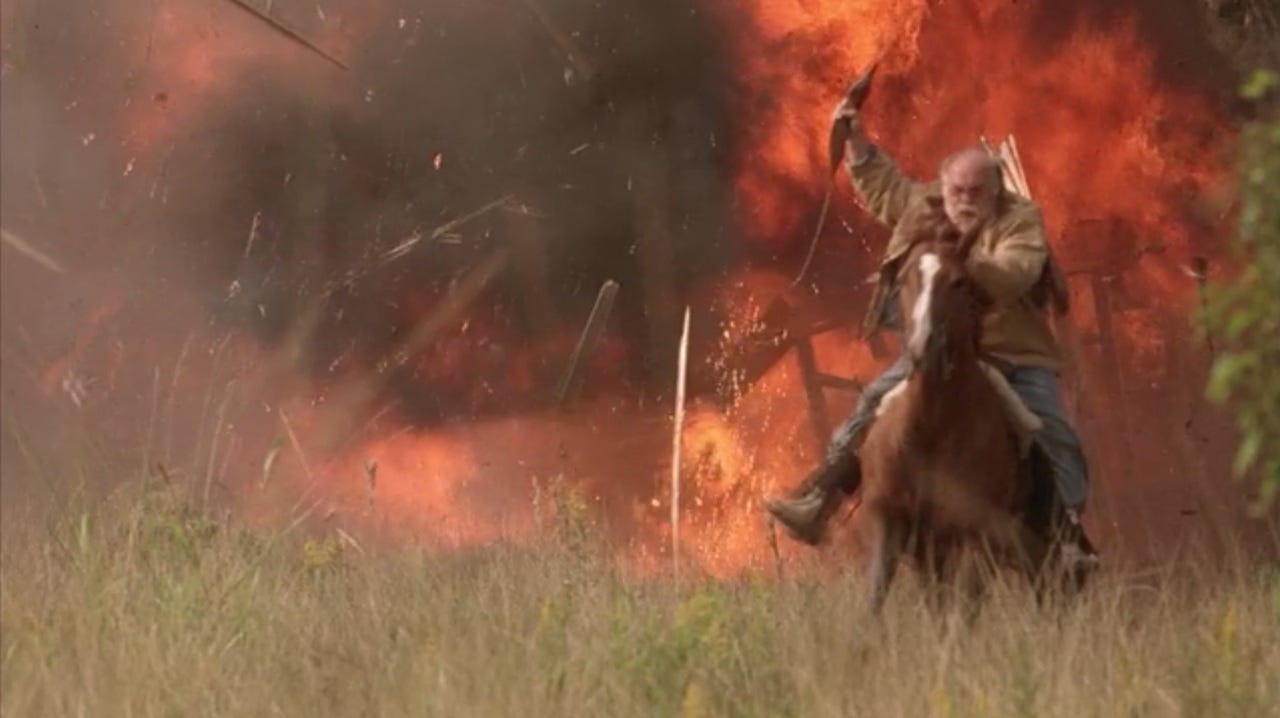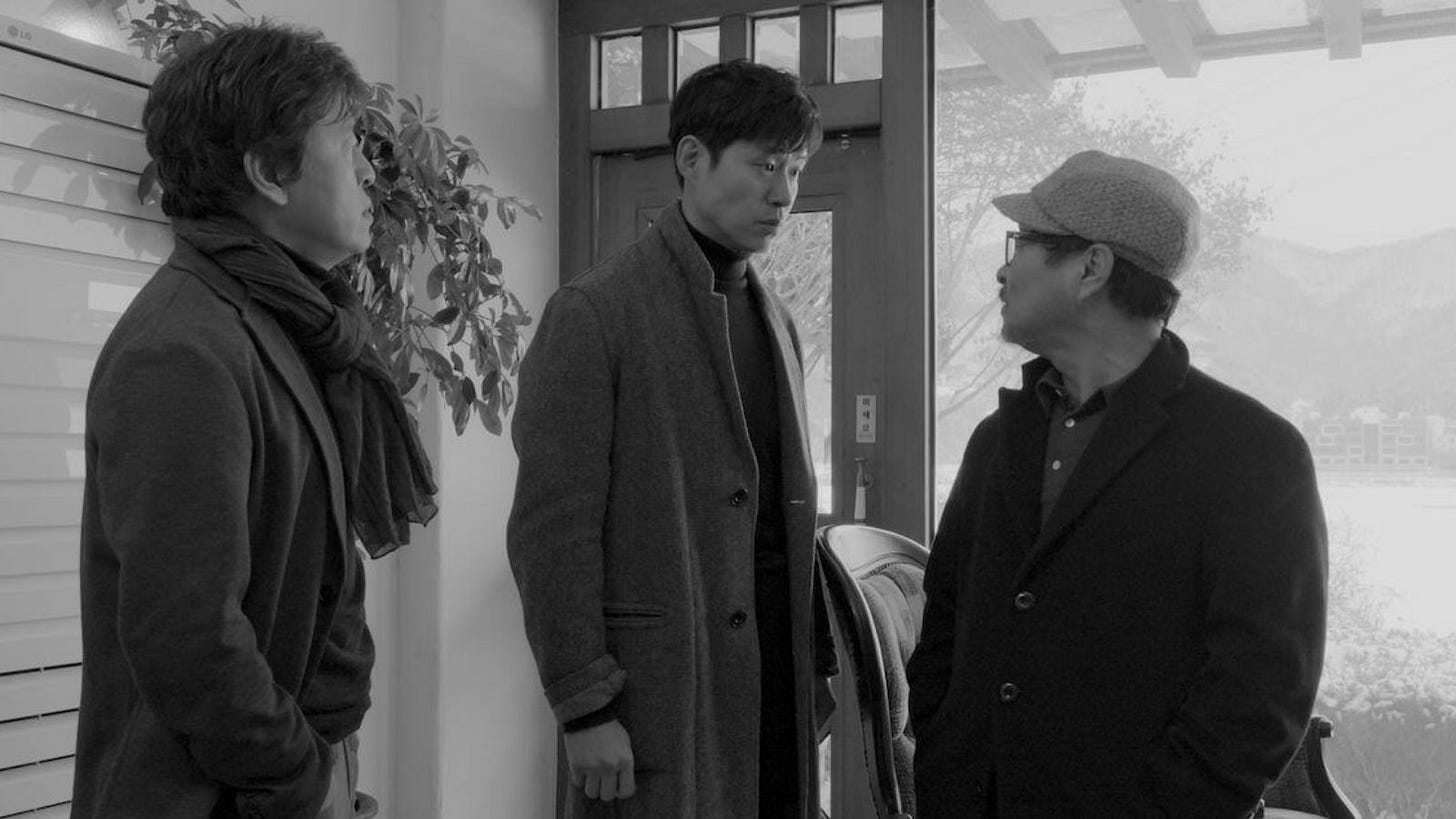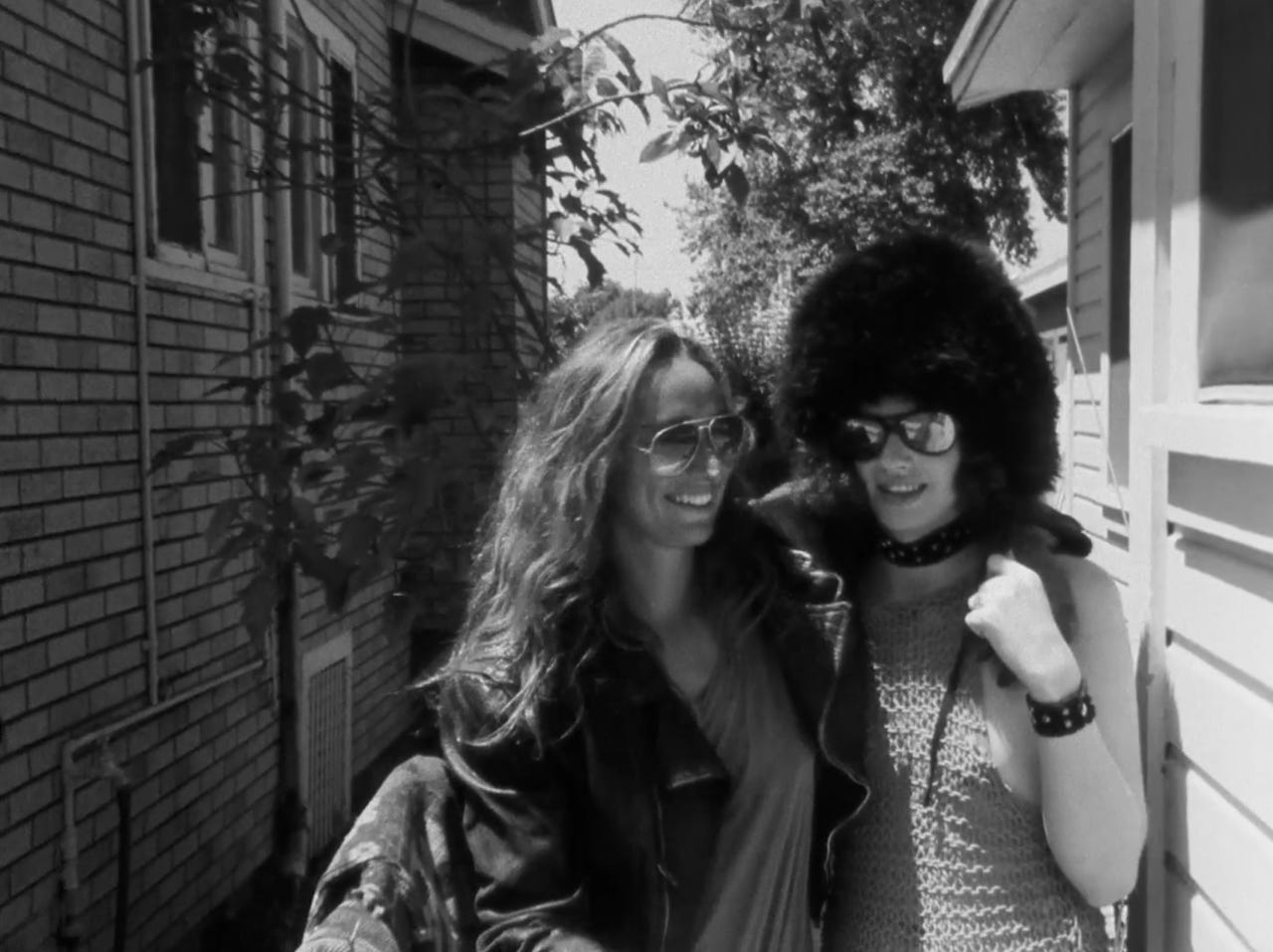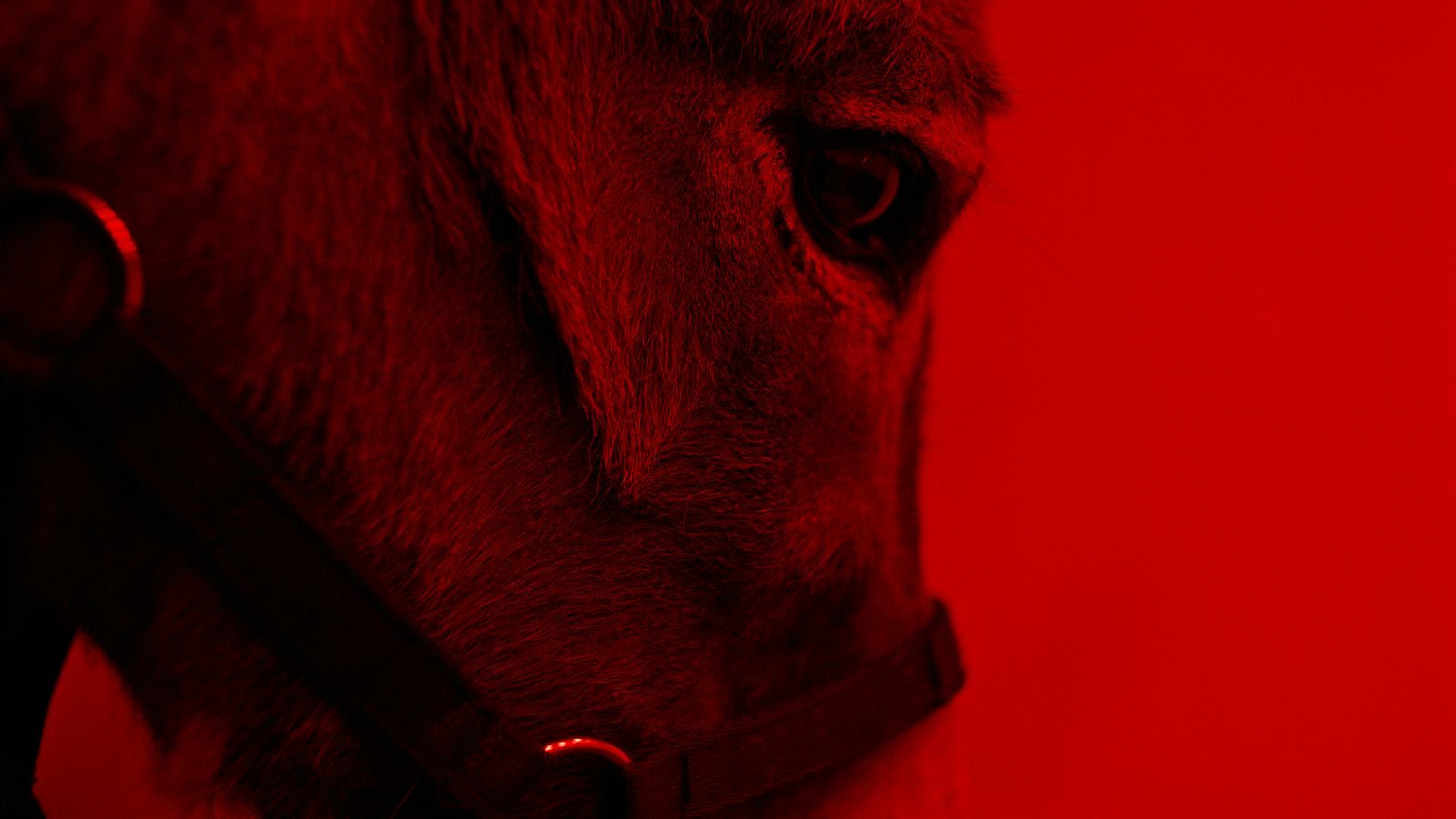roland barfs film diary weeks 4–5
hunt for the wilderpeople, over the edge, happy days, hard target, hotel by the river, i don't know, eo
January 30. Monday. We’re in Dorchester with L’s family, so we can attend her grandfather’s funeral, which is today. Unfortunately, L tested positive for COVID the previous evening, so she has to stay behind, and feels miserable about it. Somehow I am not testing positive, and neither is anyone else, so the rest of us go to the service. I leave fairly quickly afterwards to minimise the chance of infecting any of the elderly attendees, even if I’m still negative (so far). The sun comes out. In the afternoon after the funeral, we all walk to Poundbury, the bizarre experimental planned community built under the aegis of our current monarch. It is an eccentric mock-Georgian bodge-job with some occasional nice elements and a veneer of kitsch permeating the whole area. Lots of retirees. A look backwards at an England that never was. In the evening we watch Hunt for the Wilderpeople (dir. Taika Waititi, 2016). I have seen this before — I saw it at Landmark’s Shattuck Cinema in Berkeley when it came out. I just Googled that cinema to make sure I’d remembered the name, and I’m depressed to learn that both it and the California, around the corner, have both closed down over the past couple of years, and the UA Berkeley is also scheduled to close. All of these cinemas are going to be turned into apartment buildings. This means that other than the PFA, which only does rep screenings, Berkeley now only has one cinema, down from the four that were there when I lived there. This has nothing to do with Taika Waititi, but I wanted to note this sad fact. I think I might have also seen Hunt for the Wilderpeople at another point — maybe at my mother’s house — but I can’t remember it, unlike the first time I saw it which for whatever reason I can remember. I think I was feeling depressed, as was pretty typical in 2016, and it made me feel a bit less depressed. Since 2016, Taika Waititi has become more famous and more annoying than he was before his absorption into the Marvel Cinematic Universe. I guess he hadn’t made his misguided film about Nazis yet either. Hunt for the Wilderpeople is not by any means a great film, but it is an extremely low effort watch, with pretty solid performances from Julian Dennison and Sam Neill, likeable enough. I don’t know that I have anything in particular to say about this film. It’s one of those films that can serve a very particular purpose, filling a couple of hours without making any strenuous demands; it’s relatively comforting and pleasant and gently funny and requires more or less nothing from the viewer. Whatever. Good enough!
January 31. Tuesday. We return from Dorchester. L’s mum drives us to Bristol and then we get the train back to Sheffield. I’m somehow still testing negative for COVID, I guess thanks to wearing a mask whenever I’m near L. She goes to bed pretty much as soon as we get home and then stays there. I finish reading Trieste by Daša Drndić, which is an exceptionally bleak book. Helpful to get into the mindset of ruminating on the catastrophe of the twentieth century before I start my new job next week. L and I agree to sleep in separate rooms so I minimise the chance of getting sick. I set up our shitty old TV in the office and watch Over the Edge (dir. Jonathan Kaplan, 1979), which was commissioned by Julia (thank you Julia). I don’t know anything about this film before I watch it, but I seem to have inadvertently created the perfect setting for it: watching a low-quality rip, late at night, on a small television in a dark room. I like Over the Edge a lot, and I think it’s quite likely the greatest depiction of the boredom and rage of provincial adolescence that I’ve ever seen. I generally struggle with coming-of-age films — or even actively dislike and avoid them — most likely because of some lingering hang-ups about myself as an adolescent, but Over the Edge is the first film I’ve seen which really speaks to the ignored and rejected fourteen year old anarchist who squats somewhere near my soul. It’s about a bunch of kids — played, shockingly, by actual kids, rather than closely-shaved twenty-somethings — who live in a planned community in Colorado, called New Granada, where there is less than nothing to do and a steady stream of drugs. The kids hang out at the rec centre, get into small-time trouble with the police, skip school, go to house parties. Matt Dillon is in it, in his first ever performance, discovered for this film; he’s not the lead (that’s Michael Kramer), but he’s so charismatic and magnetic, long hair, grubby face, crop top — looking like he could have wandered in from a Dennis Cooper novel, or could be ready to wander into one when he’s done in New Granada — that it’s hard not to think of him as the film’s hero. It’s an hour or so of kids chafing against parental and societal authority and hypocrisy, followed up by a fantastic final conflagration in which the kids lock the adults of the town inside a PTA meeting and set fire to all their cars. The PTA meeting itself is mostly about adult anxiety that the town’s problem with juvenile delinquency and the recent shooting of a (white) child by a police officer might have an unfortunate impact on the resale value of their property. In another film that could feel a little too on the nose, but here it gives the film something of a bitter late-Buñuellian edge. It is really a great film; a genuine expression of pissed off youth, with these moments of painful shy adolescent sweetness and romance. Obviously I didn’t grow up in a planned community in Colorado in the 1970s, but the atmosphere of juvenile despondency, drinking, getting stoned (that strange turning point in teenage life when getting stoned is somehow less trouble than getting hold of some alcohol) is probably more reminiscent than my own teenage years than anything else I can remember watching. I suppose there can be a tendency to think about the violence and vandalism that bored teenagers commit being something that happens more in cities, but Over the Edge is a film about how these things happen everywhere, perhaps even more so in places that feel like the suburbs. There’s a good oral history of the making of the film, and its basis in fact — an adaptation of a newspaper article about teens in Foster City, in the Bay Area. I suppose there are a bunch of films about the so-called troubled youth — Streetwise, Out of the Blue, Paranoid Park, My Own Private Idaho, in fact much of Gus van Sant’s filmography — but Over the Edge speaks to me in a way that nothing else of this kind has. Maybe this will break my resistance to watching films about teenagers.
February 1. Wednesday. A pretty nothingy day, just sitting around the flat while the wind blows and the rain falls outside. I do a bit of cleaning but don’t really get on with anything particularly useful. In the afternoon I go to some charity shops and come home with some Perec and a collection of essays by Stan Brakhage, neither of which I expect to find. L is still ill and spends the day in bed. I still appear to be fine. In the evening I roast some vegetables. While that’s happening I watch Happy Days (dir. Patricia Rozema, 2000), which was commissioned by Tom (thank you Tom). It’s hard for me to know where to start in writing about this, because of the inescapable centrality of the work of Samuel Beckett in my life. Beckett has been important to me for so long that it’s hard for me to remember when he first took root at the base of my relationship to the world — probably it was seeing a performance of Waiting for Godot when I was 15, maybe even younger. I wrote an undergraduate dissertation on his after reading everything he ever wrote that I could get hold of. I have read all four volumes of his letters and all of the extant biographies. I abandoned academia in part because of my consciousness that, in general, literary criticism inevitably failed to adequately approach its objects, especially in the case of Beckett. I have a tattoo of a design he devised as part of the writing of his third novel, Watt, on my left arm. I’ve more or less come to accept that I will never be able to say anything of real significance about Beckett, who I can barely even bring myself to read anymore, but who is — and seems likely to always be — at the centre of my relationship to art, of all kinds. I don’t feel satisfied with that account but it’s probably giving you a suggestion of his importance to me. Anyway, this adaptation of Happy Days is part of the Beckett on Film series which appeared in the early 2000s, which resulted in a full cinematic reimagining of Beckett’s complete dramatic works. Some of these adaptations are better than others: some of Beckett’s plays lend themselves to the screen better than others, and some directors are better at understanding the nature of his work than others. I don’t know if I think that Happy Days lends itself to cinematic adaptation particularly well. It is not improved by cuts, or by variations in camera angles, or by close-ups, or by long shots of the landscape in which Winnie finds herself trapped. When you see Happy Days in a theatre, the static nature of the representation is inescapable. You have one view of Winnie and her mound, and Willie crawling around it, and you’re stuck with that view. Winnie is emphatically far away from you and the audience isn’t given the pathos of a close-up during a moment of hesitation. During one of the lockdowns L and I watched a livestream of a performance of Happy Days starring Siobhán McSweeney as Winnie. That was pretty good — mostly because it was still a theatrical performance which used the stage and wasn’t trying to be a film. Of course, Patricia Rozema’s version is a perfectly adequate iteration of Beckett’s play turned into a film, and Rosaleen Linehan is excellent, but I still find myself a bit unconvinced by the approach. Could’ve been better if it had just been a front-facing shot of the mound, if there had been less of a pressure towards the cinematic. Perhaps this will come across as snobbery or pedantry, but I don’t really mind. I reserve the right to be a snob or a pedant about Beckett especially. You can find this version of Happy Days on YouTube, and it is by no means a bad introduction to the text, if you can’t find an opportunity to see it performed otherwise.
Afterwards I watch Hard Target (dir. John Woo, 1993), which was commissioned by Andrew (thank you Andrew). I have never really found my feet with kitsch action films; I recognise that they are a source of great joy for many people, but I am probably too self-serious and miserable to really get all the way into them. I’ve not really bothered to watch much John Woo, other than, inevitably, Face/Off, and of course Mission: Impossible II. I am prepared to find Hard Target a bit of a drag, based on the description of it: a Jean-Claude Van Damme vehicle about homeless people in New Orleans who are being hunted for sport by a wealthy elite. On the surface, a film about a wealthy elite engaged in hunting impoverished people sounds like it could be fertile ground for some kind of easy or populist left-wing critique, but Hard Target manages to sidestep the risk of alienating its audience by having any kind of coherent politics through the savvy move of making all the victims of the hunters into homeless veterans. Hard Target was written by a guy called Chuck Pfarrer, a former Navy SEAL, who has also written a bunch of memoirs about his time in the military and has contributed to a couple of right-wing vigilante action movie screenplays. Obviously the poor treatment of military veterans could easily be a point of concern for a left-wing politics, but usually it’s something that right-wing people like to express concern about without ever really doing anything to ameliorate. Anyway, politics aside, Hard Target is a pretty enjoyable time, because John Woo’s style is so excessive. There isn’t really a lot of meat on the bones of Hard Target — the plot is fairly flimsy and the dynamic between Jean-Claude Van Damme (here as a guy called Chance Boudreaux, a Cajun ex-marine — Cajun as a way of getting around Van Damme’s Belgian accent) and Yancy Butler (the main female protagonist who is never much more than loosely sketched out) is pretty vapid, which means that there’s a lot of time and space for Woo to fill with his flourishes: slow motion shots, white doves flapping around, freeze frames, motorcycle jousting (which he really perfects in the unutterably kitsch climax to Mission: Impossible II), all that kind of thing. Woo has said in interviews that he was trying to import the aesthetics of Hong Kong action movies into a Hollywood production, while also combining those aesthetics with the visual language of the Western. He acknowledges that he wasn’t entirely successful in this ambition. It was his first film in the US and I guess it took him a while to warm up to the heights of Face/Off. I watch with mixed interest, sometimes bored out of my mind and sometimes thrilled. There’s something satisfyingly nostalgic about watching a film like this though; I feel a bit like I’ve rented it on VHS from Blockbuster or something. I dunno. They don’t make them like this any more, I guess.
February 2. Thursday. I don’t really do anything today, either. Much of this week has been a waste. I spend most of the day very slowly writing this diary, never quite getting into it, feeling largely dissatisfied by my work, limping towards the end. Just one of those days, I guess, in which nothing feels particularly easy. L is still testing positive for COVID but I am not. We spend all day in separate rooms and wear masks whenever we cross paths. It’s boring. I start my new job on Monday and was planning on using this week to get on with some writing, but I don’t seem to be able to focus on anything. In the late afternoon I go to therapy, and then I come home. L relocates to the living room and I relocate to the office, where I watch Hotel by the River (dir. Hong Sang-soo, 2018). This is pretty much exactly the same as the other Hong films I’ve watched over the last couple of months. I feel like now I’ve seen four of his films, I’m really starting to get a feel for his style, but I suppose I am still a relative newcomer to his work, since he’s made over thirty — I’ve barely scratched the surface. Anyway, I suppose the obvious comparison is Rohmer, but he also reminds me of Kaurismäki, or of Anita Brookner; those artists who have such a distinctive approach and style, who more or less stick with it throughout their career, using the same techniques and structures to explore similar themes. Hotel by the River is about an ageing poet who is living for free in a hotel owned by someone he met while drinking one night and who is a fan of his writing. He starts to have intimations of his mortality, so he summons his two sons, who he hasn’t spent much time with over the years, to the hotel so he can say goodbye. One of his sons, inevitably for Hong, is a film director who is currently in between projects. They have a strained reunion; the two sons bicker with each other and don’t seem to have spent much time together either, their father is distant or eccentric, there are a series of miscommunications and refusals to open up, before a classic Hong scene in which they drink loads of soju and have something like a family therapy session in a restaurant. The hotel owner asks the poet to move out of the hotel because he no longer respects him; the poet and his sons try to work this out. At the same time, there are two women staying in the hotel, who occasionally cross paths with the poet and his sons, who the poet flirts with, and who are processing their own failed or flawed relationships. I guess this one is mostly concerned with exploring regret and the difficulty of overcoming it when it appears in the context of interpersonal dynamics. Or it’s about a failure to communicate meaningfully when love is in question. Probably I’m not really deep enough into Hong’s filmography to really make much of the differences between this and his other work, though Hotel by the River seems as concerned with intergenerational blockages as it is with romantic relationships (so I suppose is closer to Introduction than it is to The Day He Arrives). Anyway, it’s shot in a very nice snowy landscape, but it’s also shot with Hong’s characteristic overexposed, blown-out, kind of half-assed cinematography, so it looks both great and kind of terrible. Someone buy this guy a light meter! Or maybe don’t — even though Hong has a nice eye for landscape and place, it’s never really the priority in his films, which are about the people in them, so his lack of interest in nice, crisp, elegant footage of the scenery feels appropriate. I liked this one. I’ll probably like the next one by Hong I watch too. Not entirely convinced I understand him fully yet.
Afterwards, I watch I Don’t Know (dir. Penelope Spheeris, 1971), which is available on RareFilmm. This is a twenty-minute nonfiction short, a mixture of staged footage and verité, about Jennifer Michaels (still going by Jimmie in the film), a trans woman who is in a relationship with the director’s sister, Linda. It is. A surprisingly sensitive film about gender, especially considering that it was made in the early 70s. It explores Jennifer/Jimmie’s experience as a series of gray areas without much clarity or certainty or resolution; we see someone accepting or evading labels or categories as their mood changes — though I suppose at the time this was shot there wasn’t really much of a readily available language to describe the experience with gender that’s been reflected on here. It feels like a film about the unfixed nature of identity — the regularity with which someone’s sense of themselves can change or reverse, soften or harden — which is a long way away from today’s understanding of gender, sexuality and how these things should be represented in the media. I Don’t Know doesn’t force its subjects into any positions, doesn’t make them defend themselves; instead it allows for the polymorphous nature of sexuality to bloom — even including the uncertainty, distaste, and resistance expressed by the filmmaker’s brother to the experiments in living that are happening around him. It’s a film about someone trying to find a way to live with themselves, and is honest in its acceptance of compromise, uncertainty, and occasional hypocrisy. There is some amazing footage of the first annual gay liberation march in Los Angeles, and it’s worth watching I Don’t Know for this archival documentary footage alone, as well as for the complexity of Jennifer/Jimmie’s relationship to gay liberation: “I wish them a lot of luck, but I’m already liberated”, she tells us, before it’s revealed that the same day she had attempted suicide. Penelope Spheeris was at UCLA at the same time as Charles Burnett and Larry Clark, and made a trilogy of documentaries about underground music in LA in the 80s and 90s — The Decline of Western Civilisation — as well as a couple of extremely lucrative mainstream comedies like Wayne’s World and The Beverley Hillbillies and The Little Rascals before she became a landlord in LA. I don’t really know her work, but this feels quite a long way away from Wayne’s World. There’s a sequel — Hats off to Hollywood — but I’ve not managed to track it down yet.
February 4. Saturday. Another extremely grey day. I am starting to feel exhausted by the monotonous skies. L tests negative for COVID, thankfully. I read W, or the Memory of Childhood by Georges Perec. I think about doing something useful with my day but don’t really get very far with that. In the early afternoon L and I go to the café in Endcliffe Park and then mooch around a bit. In the evening I meet Kate and Catherine at Showroom to watch EO (dir. Jerzy Skolimowski, 2022). I enjoy this a lot. Before we watch it, Kate says she thinks it’s going to be like Au Hasard Balthazar but ‘funkier’, which I think is a pretty good assessment of it (Catherine is less convinced by ‘funkier’). Before coming to see it, I kind of thought to myself that maybe I could just watch this at home sometime if I didn’t manage to catch it in a cinema, but I’m really glad I saw it on a large screen with good speakers — the cinematography and the sound design are both remarkable and deserve to be seen in a proper setting. I am thrilled that Skolimowski is making films as weird as his in his eighties: he has been making films across seven decades, from the 1960s to the 2020s, and has managed to resist the lure towards saccharine reflection that many older filmmakers can’t quite avoid. EO is a film about love for animals — their mute scrutiny of man across what John Berger calls ”the narrow abyss of non-comprehension”, an abyss which goes both ways — but it is also a film about Poland and Polish history; maybe even about European history more broadly. For me (perhaps inevitably) one of the most important moments in the film is when EO is trotting his way through a forest and comes across an overgrown and untended gravestone with Hebrew lettering, and then moments later we have a long, extended shot of drone footage of the Polish countryside coloured with a blood red filter. For about five minutes EO is a Holocaust movie; the question of genocide then recedes into the background but doesn’t quite disappear completely — we see random acts of violence and brutality, towards people and animals, and then it ends with an agonising shot of animals being herded into a slaughterhouse. It brings to mind the extremely troublesome analogy, popularised initially by Isaac Bashevis Singer in 1968, between organised cruelty towards animals and the Holocaust. EO doesn’t exactly make this analogy but it perhaps gestures towards it. But this is just one strand in the film, which, among everything else that it’s about, is about the director’s love for cinema, for the strange power of the cinematic image. There are cinematic allusions everywhere, and not just to Bresson. It’s a film in which dialogue is secondary, in which nothing is quite explained to the audience, in which we have to observe the world with the same kind of non-comprehension as EO. By making a film about a donkey, Skolimowski has recognised the limits of language, and he is more interested in how communication happens through sight and through noise — I think there’s a link between the sound experience of EO and the horrendous noise in Skolimowski’s The Shout. We watch EO watching the world around him; we understand a little more than the donkey does, but not that much more, and the film leaves me with a sense of the difficulty of really understanding the experience of an animal, but the demand that we try to. Berger again: “The animal has secrets which, unlike the secrets of caves, mountains, seas, are specifically addressed to man.” I’m glad Skolimowski has been nominated for an Oscar — which he definitely won’t win — for such a strange and powerful film. And all the donkeys are very nice to look at, especially while they’re just ambling around.
Dear friends, we are really approaching the end now. I’ve now written about 986 films, meaning 14 left before the film diary is done. I’m leaving commissions open for one more week — I already have four to get through, but if there’s anything you’d like me to watch I will squeeze you in. Frankly, I seem to be finding it harder to write this than I ever have before, so I’m looking forward to the end. I’m still thinking about what I might do with this Substack when I finish the diary, but nothing very exciting has come to mind. Probably I’ll take a break from writing about films for a bit, anyway. Thanks as always for your support. If you’ve enjoyed the film diary over the last four years, you can always make a contribution through Ko-Fi. I won’t bother asking you to take out a paid subscription. Thanks for reading. A




